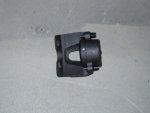I've searched the web for upgraded calipers for the 1998 Durango and the only company I could find was EGR. They completely rebuild the original "D" calipers and make them better(That's what they claim.) The salesman said; when the piston gets hot it expands and gets stuck in the caliper. This makes the truck hard to stop and there have been quite a few complaints of this problem from various "D" owners. I also experienced this problem, thus my quest to find a better caliper at an affordable price. They rebuild the caliper, bore out the hole where the piston is located for more clearance. When the piston expands from heat, the extra clearance prevents it from getting stuck. This allows the brakes to perform the way they're supposed to. The price is $240 for the pair, plus a $120 core charge. The calipers have a lifetime warranty, they also offer special brake pads and shoes. I have hawk pads/powerslot rotors already and if their calipers work as they claim I'll order the shoes for the rear. Now for the bonus, they also have stainless steel brake lines for the 1998 Durango. Based on the searching I've done, the places I've called, this is the only company that makes them (unless you have them custom made.) They have both front & rear lines and the price is $179. I ordered the calipers, the stainless steel brake lines and will post pics when I receive the package.
BTW, hello to all it's been awhile since I've posted.
BTW, hello to all it's been awhile since I've posted.





















